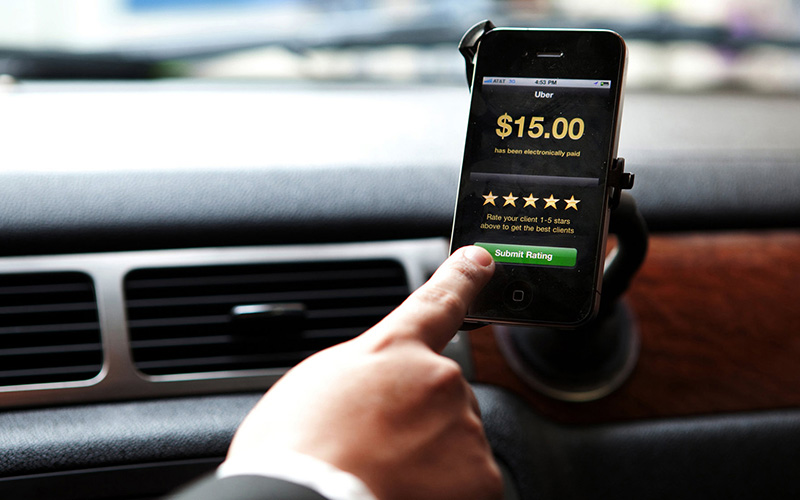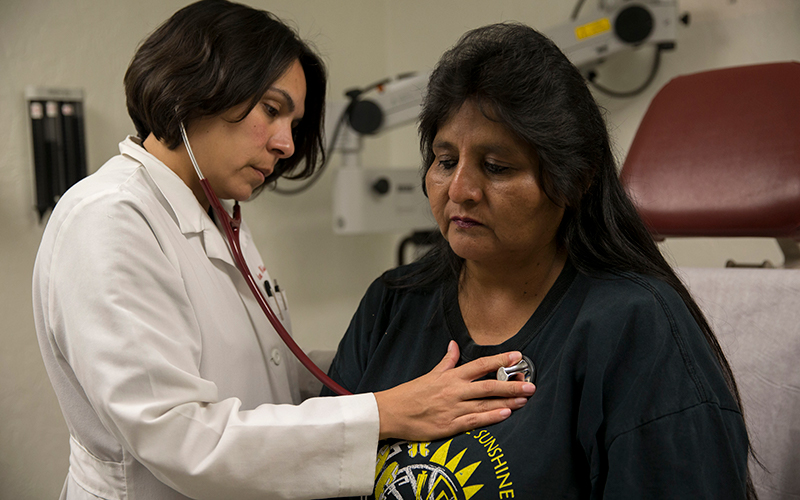
Arizona in May was the first state to let ridesharing services like Lyft and Uber take Medicaid patients to non-emergency medical appointments, but other states have followed suit. Arizona officials remain optimistic about the program. (Photo by Melies the Bunny/Creative Commons)
WASHINGTON – Uber to meetings, Uber to parties, Uber to work. Sure. But Uber to the doctor’s office?
Not only is it a thing, but for some people in Arizona, Medicaid will pick up the tab.
The state is just over six months in to a first-in-the-nation program that lets some Medicaid patients use a ridesharing service, like Uber or Lyft, to get to non-emergency medical appointments when other options are not available.
Officials with the Arizona Health Care Cost Containment System, which oversees the state’s Medicaid program, said they will not have results on the initiative until next spring, but so far they’re still enthusiastic about ridesharing for medical care.
“We’ve been looking at ways to innovate in the non-emergency medical transportation space for a couple years,” said Heidi Capriotti, an AHCCCS spokeswoman. “When we were approached by some of the rideshare companies and they shared their models with us, it seemed like a good fit for Medicaid.”
Since Arizona launched the ridesharing program earlier this year, it has spread to five more states: Georgia, Michigan, Tennessee, Virginia and Missouri.
AHCCCS in May announced a policy change that added rideshare companies to those that could register with the state as non-emergency medical transportation providers for Medicaid recipients.
It’s not as simple as just calling for a ride. Patients still have to follow the procedures when asking for any other type of medical transport: They call their health care provider who determines if a rideshare is the best fit, and then the provider arranges the pickup.
The service is only available to people who don’t have their own transportation, can’t pay for a ride and can’t arrange a free pickup through a friend or community organization.
Currently, Lyft and Uber are the two registered special providers in Arizona. Both companies work with health care centers nationwide to streamline the process for patients.
While the state has not released numbers, Uber spokeswoman Stephanie Sedlak said in an email that currently “15% of all Arizona Medicaid trips are done via rideshare.”
Mark Schmidt, the owner and general manager of Home Care Assistance in Tucson, said that many senior citizens are going to medical appointments “on a daily basis.” His center typically enlisted help from local volunteers, public transportation or taxis to get residents to their appointments, but now they have the option of calling a rideshare.
Schmidt likes the idea, even though he said he did “not know about it, to be perfectly honest.” But he’s not entirely sold.
“Here in Arizona, it’s in its infancy, and I know of no one who is participating here,” he added.
Capriotti said one of the restrictions on the rideshare service is that it must be a non-emergency call and patients using the service must not require personal assistance. But Schmidt said it’s not always that simple. He said an experienced professional, not just a rideshare driver, is essential for seniors with mobility issues or serious conditions, such as dementia or epileptic seizures.
“We find that at least half of the time, if not more, they are actually needing a caregiver with them to help them in and out of the car,” Schmidt said. He said such caregivers are trained to handle medical situations and the average driver is not.
Darren Hsu is marketing manager for a competing service called GoGoGrandparent that lets users call a number and talk to an operator to arrange a ride. It operates “in every place where the rideshare apps are available,” he said, and has the added benefit of an operator who can help locate a passenger in large areas like a shopping mall or hospital, where a rideshare driver might have trouble because of a lack of a location pin.
Hsu wonders how the ridesharing program might work in rural areas or areas without access to broadband. He also wondered if some patients might not know how to use a ridesharing service.
But others, like Brad Hargens, Mercy Care Arizona vice president of health plan operations, are sold on the program. Mercy Care Arizona added the rideshare program to the other transportation services it was already offering, and the extra option for patients is helpful, Hargens said.
With 1.8 million Medicaid recipients in the state, and the usual number of tourists flocking here for spring break and spring training, Hargens said the real challenge might be finding enough cars to keep up with the demand for ridesharing come March and April.
“We get a lot more individuals here,” he said of that time of year. “It’s just trying to find enough cars to meet everyone’s needs. That’s the difficult part.”
So far, AHCCCS has not received direct feedback from Medicaid recipients on the service, Capriotti said. But officials believe the rideshare program will “add flexibility to the health care delivery system and increase transportation options for Medicaid members.”
AHCCCS Director Jami Snyder said the state was “proud to be the first Medicaid program in the country” to offer ridesharing services for beneficiaries who need transportation to non-emergency medical appointments.
“This is a significant step forward in medical transportation services and we look forward to seeing its positive impact,” she said in a news release when the program was rolled out.



